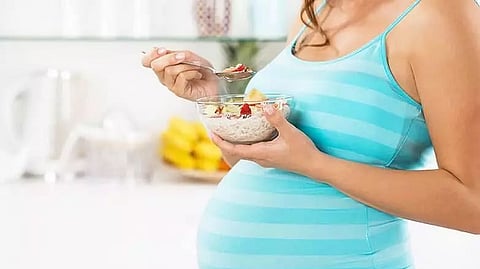
- Home
- Live Blog
- Breaking News
- Top Headlines
- Cities
- NE News
- Sentinel Media
- Sports
- Education
- Jobs

An extensive variety of nutrient-dense foods from the five food groups are included in a healthy, balanced diet.
It is very important for a pregnant woman to maintain a healthy diet during pregnancy. Maintaining a healthy diet will ensure that she is getting adequate nutrition, for herself and for her baby. It is advisable for pregnant women to follow a balanced diet, which is rich in nutrients and has low sugar, salt and saturated fats. Weight gain during pregnancy is normal. But gaining too much weight or losing weight increases the complications for the baby as well as the mother. A healthy weight gain depends on a mother's weight before pregnancy. There is evidence to support adopting Body Mass Index (BMI) as a benchmark for the acceptable weight gain during pregnancy.
Typically, a well-balanced diet will be sufficient to meet your nutritional demands while pregnant. But other foods which have higher amounts of specific nutrients that are especially advised during pregnancy should be consumed. The minerals folate, iron, iodine, and vitamin D are essential for a developing baby's health and development and can help to ward off some illnesses.
An extensive variety of nutrient-dense foods from the five food groups are included in a healthy, balanced diet. To stay hydrated, it is also great idea to drink plenty of water. Wholegrains and cereals, vegetables, legumes/beans, fish, eggs, tofu, nuts, and seeds, as well as fruits and dairy products, namely low-fat milk, cheese, and yoghurt, should all be included in the diet. Most woman go through phases of eating properly and days when they may consume more "treat" items. Cravings during pregnancy can also make this more difficult to control, especially if they involve meals that are heavy in sugar, salt, or fat. It is crucial to eat as much as you can while experiencing morning sickness or severe vomiting during pregnancy.
Pregnant women are advised some important tips while framing a healthy pregnancy diet. Some foods should be avoided during pregnancy because they may contain certain bacteria or parasites. Listeria, salmonella, or toxoplasmosis infection during pregnancy can result in serious difficulties for the unborn child and raise the possibility of miscarriage.
The fish species shark/flake, marlin or broadbill/swordfish, and catfish all have high mercury concentrations, so it is best advised to not eat these fish. During pregnancy, it is critical to choose your fish carefully. During pregnancy, it is also crucial to practise food safety and preparation prudence. Food contamination with certain bacteria or viruses is the main cause of food poisoning. Food that smells 'wrong' or appears differently than it should, make it simpler to suspect contamination. Drinking milk and water when pregnant is seen as safe. Small amounts of juice, soda, low-sugar soft drinks, and mineral water are all acceptable beverages. Caffeine in tiny levels is also regarded to be harmless in tea and coffee. It is deemed safe for a mother and her unborn child to consume up to 200 mgs per day while pregnant and breast-feeding. Salt, sugar and fat content are frequently high in processed foods. They do not provide the daily requirements for nourishment, despite the fact that they frequently taste delicious and are convenient. You will need more energy during pregnancy, as well as more servings of the five dietary groups. It's crucial to realise that, in order to meet the demands of the mother and infant, the 'serving size' remains unchanged while the diversity of foods and serves per day grows. While preparing the dietary plan, a pregnant mother should keep the following things in mind. These are:
Speak with the person who is handling your maternity care if necessary. They can recommend a dietitian who is expert in preparing a healthy eating support for a pregnant mother.
Also Read: Ageing Affects Reproductive Health
Also Watch: